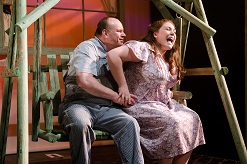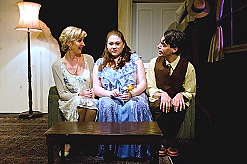No Southern Comfort at Riverside Studios
Penny Flood reviews an unusual double bill by young company Make & Bake
The double bill at Riverside Studios is an oddity: two one-act plays, Blind Date by Horton Foote and 27 Wagons Full of Cotton by Tennessee Williams.
The reason for this juxtaposition is because each play looks at the consequences of social morality in the American south in the middle of last century. The focus is on the breakdown of neighbourliness on young women, one middle-class and the other in a poverty stricken rural setting.
It’s a tenuous link.
The double bill is the work of a young production company called Make & Bake, and they give their all, with only four actors in the cast aided by some terrific, atmospheric lighting in the second half.
Horton Foote is a multi-award winning writer who wrote the screenplay for the movie of Harper Lee's To Kill a Mocking Bird, and he was the one who recommended the young Robert Duvall for the role of Bo Radley. As well as writing for film he’s written for stage and television and although he’s very well known in America, he’s not very well known here.
So, while Make & Bake are to be congratulated for showcasing his work, you have to question why they chose this slight one-act number, which was overshadowed by the Tennessee Williams in the second half.
Blind Date tells the story of a Southern matron Delores (Louise Templeton) who is trying to find her niece gentlemen callers. As a last resort, she has invited a neighbour’s son. The niece Sarah Nancy (Franscesca Fenech), gauche, nail biting and awkward in her frilly frock, doesn’t want any gentlemen callers especially not the one her aunt’s lined up for her.
It’s very funny with terrific support from Ross Ericson as Robert the husband and Sebastian Knapp as Felix the gentleman caller. But the direction has an amateurish feel, in spite a marvellous performance by Templeton who more or less carries the whole thing.

Templeton wasn’t in the second play, which is a pity for her because it’s here that the other three members of the cast really got stuck in. Twenty Seven Wagons has a stronger plot and even stronger writing. It eschews the usual Tennessee Williams themes of repressed homosexuality and frustrated middle-aged women and concentrates on hidden menace and the desperation and loneliness it engenders.
The action centres around Flora, played by Fenech, a young woman caught between two men played by Ericsson and Knapp. Ericson plays the husband, a nasty piece of work who keeps his wife under control with a mix of baby talk and physical violence. Knapp is the handsome neighbour, flirty at first but slowly revealing a very unpleasant underside.
As the two men alternate between charm and bullying, Fenech rises to the occasion brilliantly, switching between coquettishness and terror, keeping the audience on the edge of their seats as the full import of what’s happening dawns on her, and she has nobody to turn to. What makes her performance even more remarkable is that it’s her first professional outing, as she graduated from the Italia Conti Academy only this year.
Overall, the evening was unbalanced. Twenty Seven Wagons needs a strong piece of writing to counter balance it and Blind Date just didn’t do it. Horton Foote wrote more than 60 plays, nearly all of which focussed on life in small towns in the Southern states of America. It’s a shame that Make & Bake couldn’t have picked one that would do him – and the Riverside Double Bill – more justice.
The Double Bill runs until November 13. Book tickets online at Riverside Studios' website or call the box office on 020 8237 1111.
Penny Flood
November 3, 2011
